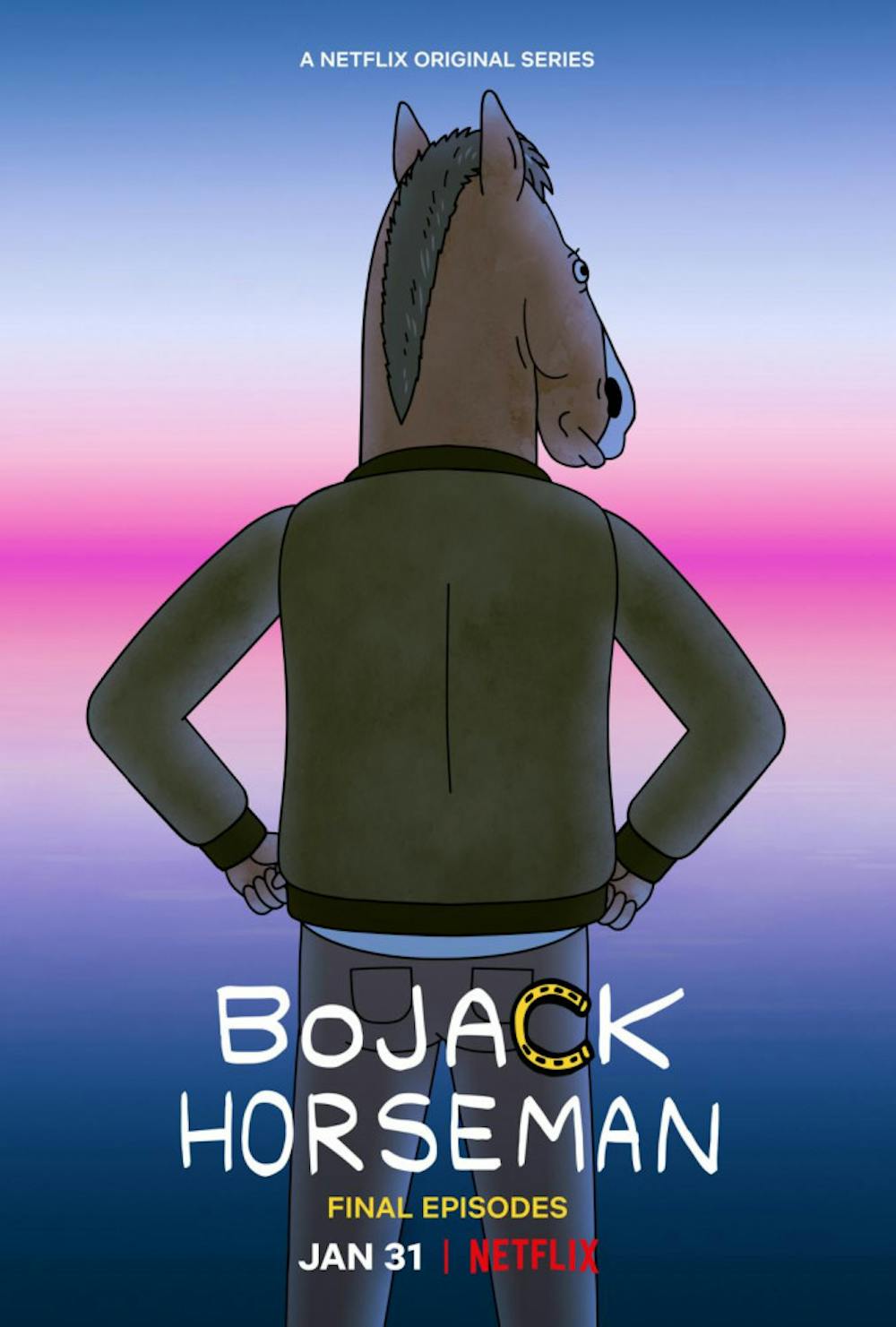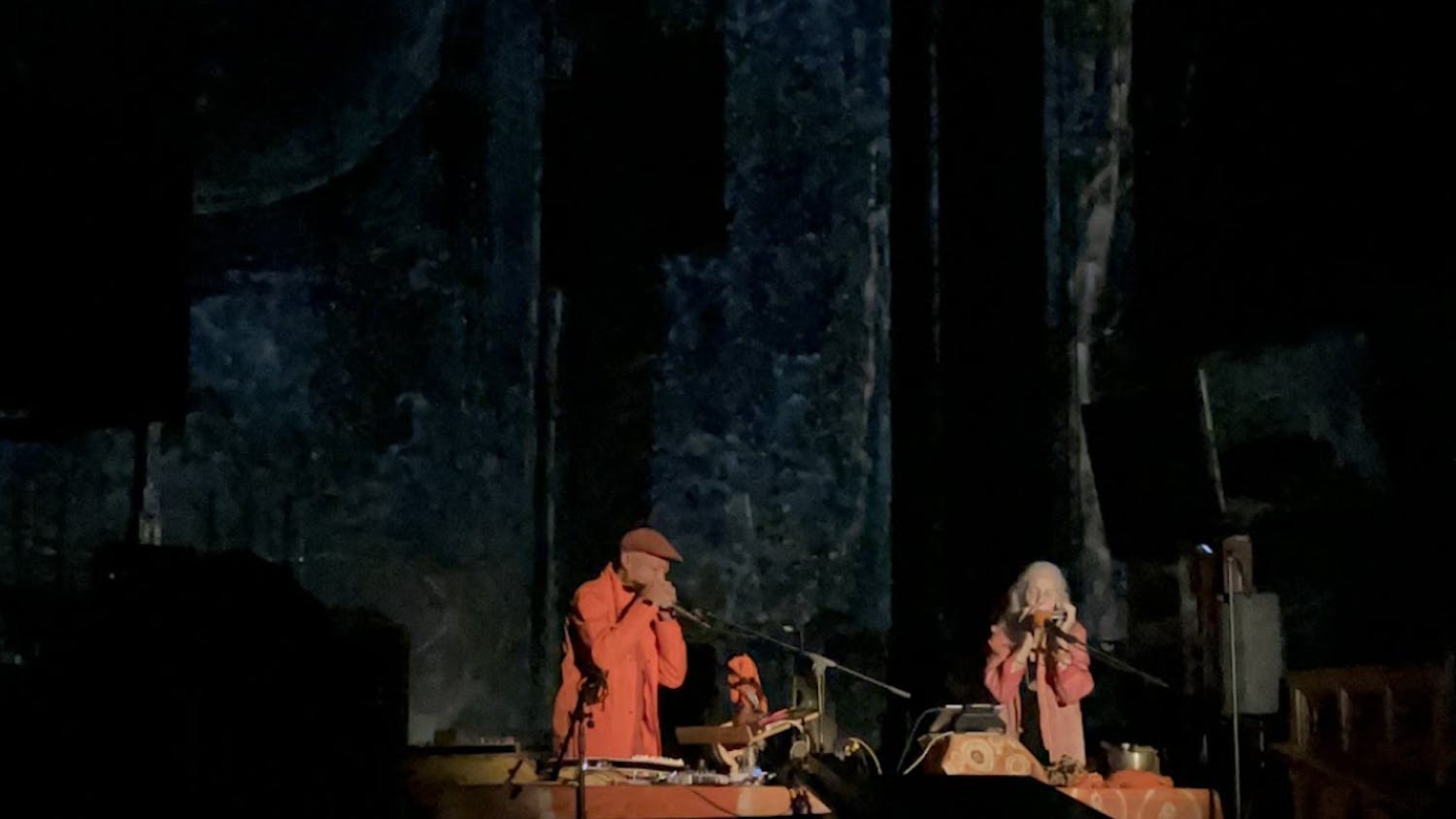Just before the show’s final fade-to-black, Bojack Horseman (Will Arnett) recites a story to his longtime friend Diane Nguyen (Allison Brie). In the story, the pseudo leader of his prison block, Big Andy, forces the block to watch the same rom-com every week during movie night. After weeks of watching the same movie, Bojack hatches a scheme to destroy the DVD and, after his plan’s success, suggests a new one. Instead of fixing the problem, Big Andy falls in love with the new flick and the cycle begins anew.
In one concisely written, only “kind of funny” anecdote, as Bojack says, the show’s entire message pours out of the screen: though the appearance of life changes, shifting circumstances and situations, the essence of it is constant. There is no grand moment of rebirth when the baggage of a past self is left behind and forgotten; we carry our entire past, every decision we’ve ever made, with us every step of the way. We can never escape our faults, or be wholly free from them; we just have to accept ourselves and strive towards betterment. Life is what it is, and nothing more.
“Bojack Horseman” is a show of supreme collaborative effort between Raphael Bob-Waksberg, the show’s creator, and the actors and actresses he employs to great effect. This show could only have been made as an animation because the bounds of reality would only serve to restrict creative potential. Each character, whether they be a Persian cat agent, an asexual rabbit or a horse actor, is entirely unique and unforgettable, creating a world unlike any other. They seem to defy the trappings of archetype and stereotype.
Season 6 Pt. 2 finds Bojack in a period of reinvention; he has been sober for some time and has taken a teaching job at Wesleyan as a professor of acting; yet, his past is inescapable. From the opening credits, which focus on Bojack’s face center-screen as he is confronted by the consequences of his past actions, the final season prompts Bojack and the viewer alike to grapple with the atrocities they have committed and witnessed. He is constantly telling people — and himself — that this is the “new Bojack,” someone who has entirely moved on from his past self, but is this truly possible?
At points, it seems as though he has changed — he seems fulfilled and successful in his profession and cares about his students — but time and again, he reverts back to his old self. After scandalous allegations of his involvement in the death of his “Horsin’ Around” co-star Sarah Lynn (Kristen Schaal), Bojack conducts an interview with Biscuits Braxby (Daniele Gaither) to tell the truth on live TV, yet even the interview is shot on a replica soundstage set of his home hours before it airs. Fueled by the reviews of a “successful” first interview, Bojack pushes for a second against the wishes of his longtime agent and former girlfriend Princess Carolyn (Amy Sedaris), believing that he has “won.” When he is in the steady structure of routine, Bojack can maintain his new self, yet under pressure, he folds and reverts back, erasing years of character reconstruction.
“Bojack Horseman” is at its filmic zenith when it recognizes and reverses the expectations of its viewership. Its self-awareness is unparalleled. This season sees Diane in her attempts to simultaneously battle depression and write her book of memoirs, her agent selling her on the idea that “sad is the new fun.” Instead, she writes — in her own words — a “middle-grade detective fiction series,” starring spunky protagonist Ivy Tran. For years, Diane has considered writing her memoirs, believing she must publish her book in order for the trauma, abuse and neglect of her youth to be “good damage,” but ultimately finds herself altogether questioning the notion of good damage. Life isn’t a perfectly written narrative that succinctly resolves all our problems in a single season, and the irony of this is not lost on “Bojack Horseman.” It is entirely unique in its refusal to resolve its characters’ problems, forcing them to carry the weight of their failures with them just as they would in real life.
The final season of “Bojack Horseman” is the most artistically adventurous of the series. It creates a completely new style of animation for Diane’s internal conversations with her book’s protagonist and depicts a talent show of friends and family for Bojack as quite literally faces his past. These episodes are not artistic feats that draw attention solely to the talent of the show’s creators; they are purposeful alterations of style that present information the most clearly and effectively.
“Bojack Horseman” has quickly become my favorite TV show for its constant reinvention, its seemingly limitless artistic imagination and its unflinching capacity to sucker punch me with a beautiful line of devastating monologue when I least expect it. The greatest compliment I can offer this show is that it is the only one that I watch both the intro and end credits for every time. “Bojack Horseman” remains a pillar of animation that draws its strength from its ability to make the nonsensical more grounded than any other television reality I’ve seen. I cannot recommend a show more highly than this. Please go out and watch it so that I can stop bringing it up at every party I attend.

Owen Mason-Hill ’22 is the Senior Arts & Culture Editor.
He previously served as a staff columnist, writing film reviews under the Reel Critic column. Mason-Hill is studying for a Film and Media Culture major, focusing his studies on film criticism and videographic essays.
His coverage at The Campus focuses primarily on film criticism, and has expanded to encompass criticism of other mediums including podcasts, television, and music under his column “Direct Your Attention.”




